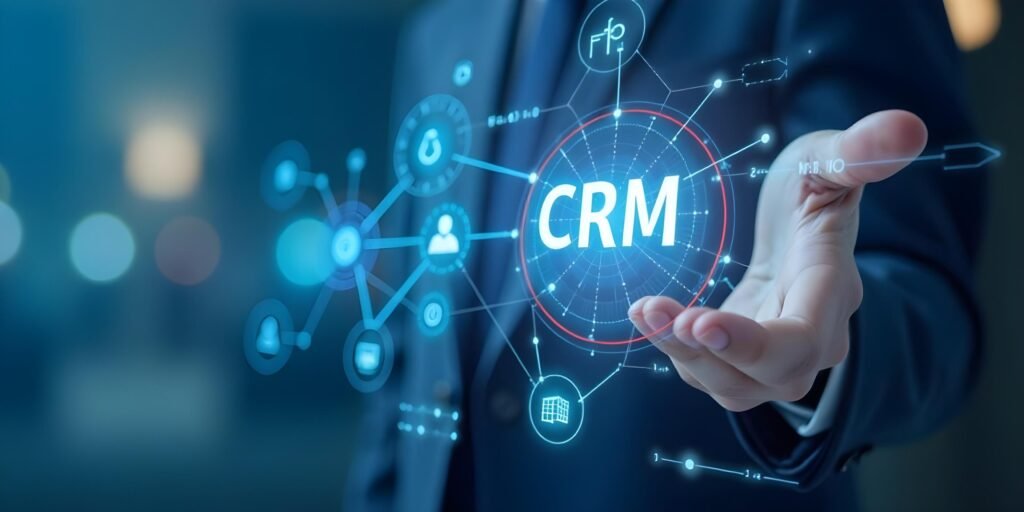
In today’s competitive market, businesses need every advantage to stay ahead, and Customer Relationship Management (CRM) systems offer that edge. A CRM is more than just a tool for storing customer information; it’s a powerful platform that streamlines sales processes, provides actionable insights, and improves customer management. By effectively leveraging CRM, businesses can boost sales, improve customer satisfaction, and enhance retention.
Types of CRM Tools and Their Functionalities
1. Operational CRM
Functionality: Automates customer-facing processes, integrating sales, marketing, and service functions for a seamless experience.
Streamlining Sales: Centralizes customer data, automating lead tracking and sales processes, enabling quicker deal closures and efficient pipeline management.
2. Analytical CRM
Functionality: Focuses on data analysis to understand customer behavior, preferences, and trends.
Streamlining Sales: Provides insights that help sales teams prioritize high-value leads and refine strategies based on performance metrics and customer data.
3. Collaborative CRM
Functionality: Shares customer data across departments, including sales, marketing, and customer support.
Streamlining Sales: Enhances cross-team collaboration, ensuring consistent communication and improving lead nurturing and customer satisfaction.
4. Sales Force Automation (SFA)
Functionality: Automates repetitive sales tasks such as tracking interactions, managing follow-ups, and generating reports.
Streamlining Sales: Frees up sales teams to focus on relationship-building, shortening sales cycles and improving conversion rates.
5. Customer Service and Support CRM
Functionality: Manages customer interactions and service delivery.
Streamlining Sales: Ensures support teams have access to sales data, facilitating prompt query resolution and enhancing customer satisfaction, increasing repeat sales opportunities.
CRM Strategies for Sales Optimization
- Personalization at Scale: CRMs allow sales teams to centralize data, enabling personalized experiences for prospects. Effective segmentation and tailored outreach boost engagement and conversions.
- Automation for Efficiency: CRM automation features such as follow-up scheduling and lead management save time, allowing sales professionals to focus on building relationships and closing deals.
- Data-Driven Decision Making: CRM analytics help teams understand customer behavior, allowing them to prioritize high-impact activities like upselling and cross-selling.
- Enhanced Collaboration: CRMs serve as a communication bridge between sales and marketing, aligning both teams to improve lead nurturing and maximize conversions.
- Strengthening Customer Relationships: CRMs facilitate post-sale engagement through customer service, loyalty programs, and personalized follow-ups, driving customer satisfaction and encouraging repeat business.
By leveraging the right CRM tools and strategies, businesses can significantly improve their sales processes, enhance collaboration, and ultimately achieve long-term growth.

Understanding CRM: A Sales Game Changer
Customer Relationship Management (CRM) refers to the strategies, practices, and technologies that help businesses manage and analyze customer interactions throughout the entire customer lifecycle. The primary goals are to enhance customer service, increase retention, and drive sales growth.
Why CRM Benefits Businesses:
- Enhanced Customer Service: CRM provides easy access to customer data, such as purchase history and interaction logs, allowing customer support teams to offer faster, more personalized service.
- Trend Spotting: By collecting and analyzing customer data, businesses can identify trends, make informed decisions, and adjust sales strategies using CRM’s reporting and visualization features.
- Automation: CRM systems automate routine tasks, such as managing the sales pipeline and follow-up emails, freeing sales professionals to focus on closing deals and building relationships.
To succeed in today’s competitive landscape, businesses must streamline their sales processes and foster better customer relationships. CRM centralizes customer information, enabling sales teams to access crucial data on interactions, preferences, and purchasing history. This centralization enhances lead management, allowing teams to prioritize prospects, automate follow-ups, and ensure no opportunity is lost.
Beyond lead management, CRM systems offer built-in analytics to provide customer insights, enabling businesses to identify trends and adjust strategies. By automating routine tasks like scheduling and follow-up emails, CRM empowers sales professionals to concentrate on building relationships and driving conversions. CRM tools also facilitate improved team collaboration, ensuring seamless communication and alignment throughout the sales process.
As more companies recognize the value of CRM, its adoption continues to grow . Businesses utilizing CRM tools report improved sales productivity, higher customer retention, and overall operational efficiency, proving CRM to be a transformative tool for business success. Click here to read blog related to emerging trends related to CRM and how CRM benefits small businesses
| Metric | Companies Using CRM | Companies Not Using CRM |
| Increased Sales | 65% | 29% less likely to close deals |
| Customer Retention | 27% increase | 25% lower retention rates |
| Improved Data Management | 74% | 40% experience challenges |
| Higher Customer Satisfaction | 91% | 60% report inconsistent communication |
Strategy 1: Centralizing Customer Data for Personalization
The Power of a Unified Customer Database in CRM
A unified customer database is critical for successful Customer Relationship Management (CRM), offering a 360-degree view of each customer. By consolidating essential data—such as contact details, purchase history, preferences, and interaction records—into one centralized platform, businesses eliminate the inefficiencies caused by fragmented data silos. This holistic approach boosts data accuracy and empowers sales and marketing teams to make informed, real-time decisions.
With a unified database, businesses can track customer interactions seamlessly, personalize outreach, and identify engagement-driving trends. This comprehensive view enables companies to deliver consistent, tailored experiences, building stronger relationships and fostering long-term customer loyalty.
How CRM Empowers Sales Teams to Personalize Outreach
CRM systems are transformative for sales teams, offering personalized and data-driven outreach. By centralizing customer information, CRM tools provide deep insights into each customer’s behavior, purchase history, and interaction patterns. This allows sales representatives to segment customers based on demographics, preferences, and engagement levels, ensuring that outreach efforts are precisely targeted and relevant.
In addition, CRM systems track interactions across multiple channels—such as email, social media, and phone—giving sales teams a complete understanding of each customer’s journey. For example, if a customer shows interest in a particular product, a sales representative can proactively offer tailored promotions or suggestions, enhancing engagement and increasing the likelihood of conversion.
CRM systems also offer automation features, allowing sales teams to automate follow-up emails, reminders, and customized marketing campaigns based on customer behavior. This efficiency ensures timely, personalized outreach without missing any engagement opportunities, helping to strengthen relationships and drive conversions.
Real-World Success Stories
A leading e-commerce retailer leveraged its CRM to segment customers by behavior, such as frequent buyers and seasonal shoppers. By sending personalized emails with product recommendations based on past purchases, the company achieved a 25% increase in conversion rates during promotional campaigns. This targeted approach not only boosted engagement but also enhanced customer satisfaction.
Similarly, a SaaS company used CRM analytics to track how customers interacted with their software. By identifying underutilized features, the sales team offered personalized training and tips, resulting in higher user adoption rates and reduced churn. This example shows how tailored communication, backed by CRM insights, can significantly improve customer experience and retention.
Strategy 2: Automating Routine Tasks to Boost Efficiency
Unlocking Efficiency: The Automation Features of CRM Systems
Automation in CRM systems is a game-changer, greatly enhancing sales efficiency by reducing administrative tasks. These features empower sales teams to focus on relationship-building rather than tedious processes.
Streamlined Scheduling
One of the standout automation features in CRM is automated scheduling. By integrating calendars and sending automatic meeting reminders, CRMs ensure sales reps never miss key interactions with leads or clients. This consistent communication builds trust and strengthens relationships.
Effortless Follow-Up Management
CRMs also excel at follow-up management. Automation ensures timely follow-up emails or messages are sent based on customer triggers, like when a lead shows interest or after a meeting. For example, if a prospect downloads a resource, the CRM can send a personalized follow-up email offering additional insights. This boosts engagement and conversion potential without overwhelming sales teams.
Intelligent Lead Scoring
Another valuable automation feature is lead scoring. By automatically scoring leads based on behavior and interaction history, CRMs help sales teams prioritize the most promising opportunities. Prospects with high scores—such as those frequently visiting the website or engaging with emails—are flagged as likely to convert, allowing teams to focus resources on high-yield leads.
Focusing on Relationship-Building
Automating routine tasks like data entry, follow-ups, and scheduling frees up sales teams for more valuable activities, such as building relationships with clients and prospects. With more time to engage in meaningful conversations and address client needs, sales reps can act as trusted advisors, fostering loyalty and driving long-term growth.
Real-World Impact: E-Commerce Success
A mid-sized e-commerce company saw remarkable results by automating follow-up emails for abandoned carts. Before automation, manual follow-ups led to lost opportunities. Post-automation, personalized emails with special discounts were sent shortly after cart abandonment, leading to a 20% increase in converted sales. This shows how CRM automation can optimize sales processes, boost customer engagement, and significantly increase revenue.
Strategy 3: Leveraging CRM Analytics for Data-Driven Sales

Leveraging CRM Data for Customer Behavior and Sales Performance Analysis
Effectively using CRM data is essential for businesses to make informed decisions and optimize sales strategies. CRM systems collect extensive data from customer interactions, including purchase histories, engagement levels, and feedback. This data can be leveraged to identify patterns, understand customer behavior, and analyze sales performance.
Understanding Customer Behavior
CRM data provides deep insights into customer behavior, such as buying patterns, seasonal trends, and preferred communication channels. By analyzing this data, sales teams can tailor their outreach to align with customer preferences. For instance, if CRM data reveals that customers engage more during a specific season, sales strategies can be adjusted to capitalize on those high-activity periods, leading to better engagement and higher conversion rates.
Analyzing Sales Performance
CRM systems allow businesses to analyze sales performance by tracking key metrics like conversion rates, average deal size, and sales cycle length. This analysis helps organizations evaluate the effectiveness of their strategies and optimize their approach. For example, if a particular sales rep consistently performs well with certain products, their approach can be replicated across the team. This data-driven approach ensures continuous improvement and alignment with market demands.
Unlocking Upselling and Cross-Selling Opportunities
CRM data is instrumental in uncovering upselling and cross-selling opportunities. By analyzing purchase histories, businesses can identify trends that guide these efforts. For example, if a CRM reveals that customers who purchase a specific product often buy complementary services, sales teams can proactively recommend those add-ons. This strategy not only increases transaction value but also improves the customer experience.
Segmenting for Targeted Strategies
Customer segmentation allows businesses to craft targeted sales strategies. By analyzing CRM data, sales teams can identify customer segments with specific behaviors or needs. For example, if premium product upgrades are trending, personalized upgrade offers can be sent to existing users. This type of segmentation, coupled with tailored messaging, increases the likelihood of successful upsells and boosts customer satisfaction.
Contextualizing Customer Interactions
CRM systems track interactions and feedback, offering valuable context for upselling and cross-selling. If a customer shows interest in certain features, sales teams can use that insight to recommend related products. This personalized approach shows attentiveness to customer needs, making additional purchases more likely.
Optimizing Sales Strategies
Using CRM data to optimize sales strategies is key to improving effectiveness. By analyzing lead conversion rates, sales teams can identify the most successful outreach methods. For example, if personalized emails outperform generic ones, sales teams can shift focus to more tailored communications, boosting conversion rates.
CRM insights also help in evaluating the performance of individual reps and teams. Tracking metrics like win rates and deal sizes can pinpoint areas for improvement. If a team underperforms in a specific product category, targeted training or resources can be provided to improve results.
Identifying High-Value Customers
CRM data helps businesses identify high-value customers by analyzing purchasing behaviors. Tailored marketing campaigns and personalized sales approaches can then be developed to resonate with these customers. For example, if frequent buyers of certain add-ons are identified, sales teams can offer related products, maximizing upsell opportunities and driving revenue.
By effectively leveraging CRM data, businesses can better understand customer behavior, optimize sales strategies, and improve overall performance, leading to higher customer satisfaction and increased revenue.
Strategy 4: Improving Collaboration Between Sales and Marketing
Customer Relationship Management (CRM) systems play a pivotal role in uniting sales and marketing teams, helping them collaborate toward shared business goals. By centralizing customer data, CRM platforms ensure both teams have a unified view of the customer journey, facilitating seamless cooperation.
Leveraging Customer Insights for Targeted Campaigns
CRM systems enable marketing teams to harness valuable customer insights from sales data. By understanding customer behavior, preferences, and demographics, marketing can craft more targeted campaigns. For example, if sales data shows a surge in interest in a specific product, marketing can respond with promotional content tailored to that demand. This alignment between sales and marketing creates a more personalized customer experience, boosting engagement and conversion rates.
Tracking Marketing Campaign Effectiveness
A CRM system offers a comprehensive view of campaign effectiveness by tracking key metrics such as lead generation, conversion rates, and customer engagement. Both teams can assess which campaigns are performing well and which need adjustment. This data-driven analysis allows for more strategic resource allocation, ensuring marketing efforts are aligned with sales goals and contribute to revenue growth.
Creating a Cohesive Customer Experience
CRM acts as the central connector that enables sales and marketing to work in harmony, ensuring a unified approach to customer engagement. With shared insights, both teams can optimize strategies, resulting in a seamless and consistent customer experience. The result is higher conversion rates, increased customer satisfaction, and better business outcomes.
Understanding Customer Journeys through CRM
CRM systems are essential for tracking marketing campaigns and gaining insight into the customer journey. By analyzing data from various touchpoints, businesses can understand how customers interact with marketing content, helping to refine strategies and improve engagement.
Mapping the Customer Journey
With CRM data, marketers can effectively map out the customer journey, identifying key moments that influence purchasing decisions. This allows for targeted messaging at different stages, such as educational content during the awareness phase or personalized offers during the decision-making phase. Tailoring communication to each stage of the journey helps nurture leads and increases conversion rates.
Audience Segmentation for Personalization
CRM systems excel at audience segmentation, allowing businesses to personalize communications based on customer behavior and preferences. For instance, if a customer has shown interest in a product but hasn’t completed the purchase, the CRM can trigger a follow-up email with a special offer to encourage the sale. By segmenting and targeting specific customer groups, businesses can create more impactful and relevant marketing efforts.
Driving Long-Term Success
By tracking campaigns and understanding the customer journey through CRM data, businesses can refine their marketing strategies and improve overall customer experience. This data-driven approach enables organizations to craft more cohesive, personalized marketing initiatives that not only engage customers but also foster long-term loyalty and success.
Case Study 1:
Tech Solutions Company A mid-sized tech solutions provider revamped its lead nurturing process by implementing a CRM system to bridge the gap between its sales and marketing teams. Before this, the two departments operated independently, resulting in inconsistent communication and missed opportunities. With the CRM, marketing began tracking lead interactions, such as webinar attendance, and shared these insights with sales. For example, when a lead attended a webinar, this activity was logged in the CRM, prompting the sales team to send personalized follow-up emails discussing relevant webinar topics. This coordinated approach resulted in a 30% increase in lead conversions over six months, driven by timely, personalized follow-ups.
Case Study 2:
E-commerce Retailer An e-commerce retailer leveraged its CRM to refine its lead nurturing and reduce shopping cart abandonment. By analyzing customer behavior data, the marketing team identified a high rate of abandoned carts. Using the CRM, they set up automated email campaigns to re-engage these leads with personalized offers based on their browsing and purchase history. Sales representatives also gained visibility into the specific products customers showed interest in, allowing for more targeted outreach. This collaborative CRM approach resulted in a 25% increase in recovered abandoned carts and significantly boosted customer engagement.
Case Study 3:
Financial Services Firm A financial services firm integrated its sales and marketing data through a CRM to improve lead nurturing. They designed targeted campaigns based on customer segments, such as financial goals and preferences. The CRM tracked inquiries about specific services, enabling the sales team to follow up with personalized consultations linked to the marketing campaigns that sparked the leads’ interest. This data-driven collaboration between sales and marketing led to a 40% increase in qualified leads entering the sales funnel and significantly improved customer satisfaction.
Case Study 4:
SaaS Company A SaaS company implemented a CRM-based scoring system to enhance lead nurturing. By aligning sales and marketing around this scoring model, they focused their efforts on leads most likely to convert. The CRM tracked key interactions, such as product demos and free trial sign-ups, allowing the sales team to personalize their conversations to address specific pain points. This alignment resulted in a 50% increase in lead conversion rates and a shorter sales cycle, as the team prioritized high-potential leads and provided tailored solutions during follow-ups.
These case studies highlight the transformative power of CRM alignment, illustrating how organizations across various industries can significantly improve lead nurturing, boost conversions, and enhance overall customer satisfaction by fostering collaboration between sales and marketing teams.
Strategy 5: Enhancing Customer Retention through CRM
The Role of CRM in Post-Sale Customer Service and Satisfaction
CRM systems play a vital role in enhancing post-sale customer service and ensuring customer satisfaction—key components in building long-term relationships and fostering loyalty. After the sale, CRM platforms help businesses maintain consistent communication with customers, enabling swift and efficient support. By centralizing critical data such as purchase history and past interactions, customer service teams can quickly access relevant information, reducing response times and delivering a seamless, personalized experience.
Personalized Follow-Up Interactions
One of the standout features of CRM systems is the ability to personalize follow-up interactions. Businesses can automate post-sale communications, such as thank-you emails, feedback requests, and satisfaction surveys. This demonstrates that the business values the customer’s opinion and helps collect vital data for ongoing improvements. Analyzing feedback within the CRM system allows companies to identify patterns and areas for enhancement, leading to more tailored services and better customer experiences.
Enhancing Loyalty Programs
CRMs also enhance loyalty programs by tracking customer behavior and preferences over time. This data allows businesses to design targeted campaigns, offering rewards or incentives based on previous purchases or engagement. For example, if a customer regularly buys a specific product, the CRM can trigger special offers on related items, making the customer feel appreciated while encouraging repeat purchases.
Loyalty programs managed through CRM systems are more dynamic and personalized. Retailers, for instance, can establish a points-based system where customers earn rewards for purchases, redeemable for discounts or exclusive offers. These programs encourage customer retention by offering tangible benefits for continued engagement.
Importance of Regular Follow-Ups
Consistent follow-ups are essential in maintaining strong customer relationships. CRM systems automate these processes, ensuring that no customer is overlooked. Whether it’s sending a thank-you note after a purchase or following up to check on satisfaction levels, proactive communication reassures customers that they are valued.
For example, automated reminders within the CRM ensure that service teams check in with customers periodically, offering assistance or solutions if needed. This personal attention not only resolves potential issues before they escalate but also fosters trust and long-term loyalty.
Analyzing Effectiveness
CRM systems also provide robust analytics, enabling businesses to assess the effectiveness of their loyalty programs and follow-up strategies. Metrics such as reward redemption rates, customer engagement levels, and feedback response rates help companies fine-tune their approaches. This data-driven method allows businesses to continuously refine their loyalty offerings, ensuring they align with evolving customer needs.
Building Long-Term Relationships
Investing in post-sale communication and relationship-building creates a foundation for long-term growth. Satisfied customers are more likely to return, making them a reliable source of ongoing revenue. Additionally, these loyal customers often become brand advocates, sharing positive experiences and driving word-of-mouth referrals, which can be more effective and cost-efficient than traditional marketing efforts.
Understanding Customer Needs
CRM systems help businesses stay attuned to customer needs. By maintaining detailed records of interactions and purchases, companies can better understand customer preferences, allowing for more personalized upselling and cross-selling opportunities. For instance, a customer who frequently purchases a certain product can receive targeted recommendations for complementary items, enhancing their overall shopping experience and increasing average transaction values.
Proactive Communication
CRM systems also facilitate proactive communication, which helps businesses address concerns before they become issues. By keeping an open line of dialogue, companies demonstrate that they are committed to customer satisfaction, which fosters deeper loyalty. Customers who feel heard and appreciated are more likely to continue their relationship with a business, increasing their lifetime value.
In conclusion, CRMs are not just tools for managing sales pipelines—they are critical for post-sale customer service and satisfaction. By centralizing data, personalizing interactions, and supporting loyalty initiatives, CRM systems help businesses maintain strong relationships that drive long-term success.
Conclusion: Transforming Sales Success with CRM
CRM systems play a pivotal role in driving sales success by streamlining processes, fostering collaboration between sales and marketing teams, and enabling data-driven decision-making. From enhancing lead nurturing and personalizing outreach to optimizing post-sale customer service, CRMs empower businesses to deliver tailored experiences that build stronger relationships and boost conversion rates. By centralizing customer data and automating routine tasks, CRM tools free up valuable time for sales teams to focus on high-impact activities like relationship-building and closing deals.
For businesses seeking a structured, data-driven approach to sales, investing in a CRM is essential. Not only does it improve efficiency, but it also provides critical insights that help teams prioritize leads, track performance, and identify opportunities for growth.


